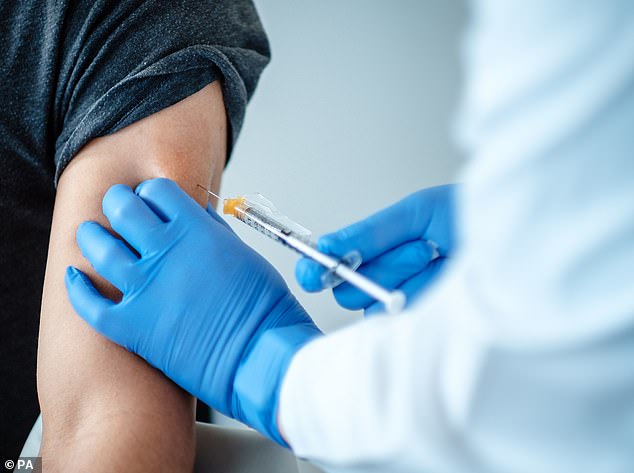NHS army of volunteers who signed up to help shielders in April will be trained to deliver Covid-19 vaccines as soon as one is approved
- More than 750,000 answered the health services call for aid in the pandemic
- And today it was revealed they would be enlisted to administer a Covid-19 jab
- The vaccine could be approved in the UK as soon as December 7
The army of health volunteers who signed up to help the NHS in April will be deployed to deliver a Covid-19 vaccine as soon as one is approved, health chiefs have said.
More than 750,000 people answered the NHS’s call for aid at the peak of the first wave, and were enlisted for duties including delivering goods to the elderly and taking patients to hospital for appointments.
Today it was revealed they would be asked to help administer vaccines to members of the public, helping to bring the epidemic to an end.
A Covid-19 vaccine could be approved as soon as December 7, according to reports, with those over 80, in care homes or working as health workers first in line for the shots.
The NHS plans to give out the doses to the public through ‘mass vaccination centres’ across the country, which will have the capacity to inoculate up to 5,000 people a day each.
It is unclear how much the roll out will cost, but the final price tag is expected to run well into the millions. More than 30,000 volunteers are being sought by St John Ambulance to man the hubs.
A vaccine is seen as the best hope for ending the pandemic because it would trigger the production of antibodies capable of fighting off the virus. This would stop people being infected by it and spreading the disease to others.
A Covid-19 vaccine could be administered by NHS volunteers in England. (stock)
A screenshot of an email sent to NHS volunteers, and reported by LBC, says they will be ‘trained to deliver a vaccination to a patient. They will also be ready to act if a patient has an adverse reaction’.
It also lists roles for volunteers as a vaccination carer or a patient advice.
Vaccine carers ‘will support patients all the way through, from arrival to discharge,’ it says.
‘They will help patients get to the right place to receive their vaccination and provide first aid if anyone has a medical emergency.’
It adds that patient advocates ‘will concentrate entirely on the welfare of patients, potentially looking after people and small groups all the way through the vaccination centres.’
The NHS volunteering page for Covid-19 says online NHS volunteers will have ‘further roles available supporting the Covid-19 vaccination efforts in future’.
St John Ambulance is leading a drive to recruit 30,000 volunteers to deliver the Covid-19 vaccine across England. It had signed up 1,500 by November 16.
Recruitment documents, seen by the Daily Mail, show that vaccination volunteers are only required to have two or more A-levels.
They will be ‘trained to deliver the actual injection to patients [and] potentially react to any immediate adverse reactions’.
The job specification adds: ‘We’ll provide training for non-first aiders, including administering injections.’ Volunteers must be aged 18 to 69, deemed at low risk of Covid-19 and willing to commit to at least two six to eight-hour shifts per month.
The organisation is also looking to recruit vaccination care volunteers – who will support patients before and after their jabs by ‘providing reassurance and potentially dealing with medical emergencies’ – as well as welcome team volunteers to help with the recruitment drive. Participants have been told they will be deployed as soon as the beginning of December.
Its chief operating officer, Richard Lee, said: ‘We are proud to have been asked to lead the voluntary sector’s contribution in helping the NHS deliver its mass vaccination programme.
‘This new agreement highlights just how much respect our charity has won during our ongoing response to the pandemic, as the nation’s health reserve and a trusted partner to the NHS.
‘St John people are best known for helping the events that bring communities together happen – everything from football matches to firework displays.
‘Like everyone else, we are keen to get back to normal and mass vaccination is a vital way of making that happen.’
